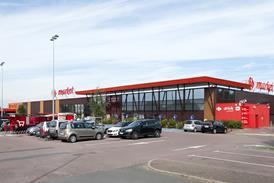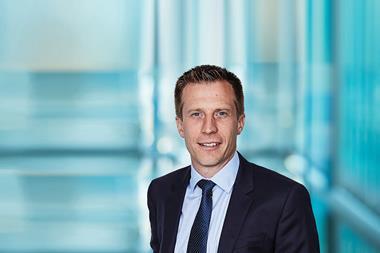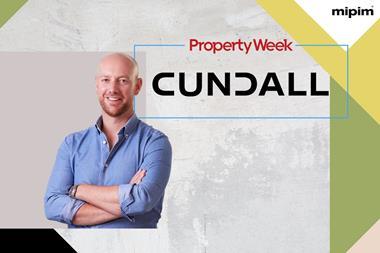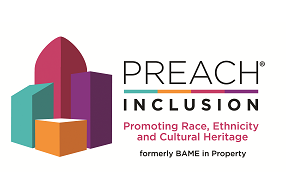Often credited to management guru Pete Drucker, there is a saying popular in HR circles that ‘if you can’t measure it, you can’t improve it’. As a diversity, equality and inclusion (EDI) approach and ethos, it is a maxim that has very much been embraced by property development firm British Land, as HR director, general counsel and company secretary Brona McKeown explains.
“It’s about data, data, data; that’s where my head is at,” she tells Property Week. “We survey our employees every year and we cut the questions by frankly every way I can think of. For example, when we ask people to describe themselves – and it is all anonymous, of course – as well as heterosexual or non-heterosexual, gender, age, we now do two different things. The year before last we began asking questions like ‘did you have free school meals?’ Or ‘were you the first in your family to go to university?’
“We’ve also recently changed our disability question. We moved it from ‘do you consider yourself to have a disability?’ We worked with one of our enaBLe disability network to move it to a much more open question. ‘Do you have any difficulty in performing day-to-day activities, eg walking, communicating, hearing, seeing (even if you wear glasses) or because of a mental, intellectual, sensory or physical health condition that has lasted or is expected to last at least six months?’ And the number who answered as identifying as having a disability leapt. So, it is about making sure you ask the right questions,” she points out.
“It is often the tyranny of small numbers. But at the same time, what I am looking for is statistical deltas. So, if we have a question like ‘how engaged are you with the business?’ I am looking for, if I cut that by different self-identified groups, do I see those scores blow out by more than 5%? Because anything more than 5% is significant. You need to look at your data that way, because that takes the emotion out of it,” she adds.
With 650 employees, the company is hugely committed to EDI. It has a 2030 Diversity, Equality & Inclusion Strategy, which is led by the senior leadership team and the company’s dedicated head of employee relations and EDI Ade Onagoruwa. The strategy covers recruitment and career progression, leadership, working with industry and suppliers and the organisation’s wider commitment to places and communities.
In practice, and to highlight just some examples, this means within recruitment and career progression, for instance ensuring that processes are free from bias, that managers are trained to recognise and support different pathways, that the business takes part in initiatives such as #10000 Black Interns and that it actively records and monitors race, gender, sexual orientation, age, caring responsibilities and ability of applicants.
Or, on leadership, that executive and leadership teams have diversity improvement objectives, that chief executive Simon Carter has signed up to the Real Estate Balance commitments to create a more diverse industry, that the leadership team has participated in a mandatory reverse mentoring programme and so on.
The business has 10 employee advocacy groups, including the enaBLe disability network, as already touched upon, plus BL Pride (LGBTQ+), REACH (race, equality and celebrating heritage), Parents and Carers, and Wellbeing. Then there is equitaBLe (women and gender), Sports and Social, SustainaBLe (the environment and sustainability), Cycling, and NextGen.
Executive and leadership teams have an objective to reduce median pay gaps by 2% year on year (both for gender and ethnicity). For the year to March 2022, which is the most recently published data, the median gender pay gap for the organisation stood at 27.6% and the median ethnicity pay gap at 27.3%.
Ethnically diverse employees as of March 2023 made up 14.9% of employees generally in British Land (up from 12.5% in 2021). In the FTSE women leaders recent survey published in Feb 2023, the company’s women made up 33.9% of leadership positions (the executive committee and direct reports) and 40% of the board.
In December, too, the company was ranked the top property company (and 16th overall) in the Social Mobility Foundation’s index of the top 75 UK employers taking action to improve social mobility in the workplace.
A lot of this activity is, again, driven through data and analytics but, crucially, also by ensuring that data, once collected, is tangibly acted upon, stresses McKeown.
“For example, we are launching our learning and development portal. The first slide says ‘78% of you said you had the right access to the learning to do your job’, x% of you said what you’re not quite sure about career progression. So, we’re trying all the time to go back to, ‘you said, we did’,” she points out.
“Last year, too, our employee survey said that people thought our benefits had fallen behind the market. We benchmarked and the answer was that, basically, they hadn’t at all. But the perception had. And that was because we weren’t making it easy for people to see everything they had. We had different bits of the business with slightly different historical terms; we’d been a bit embarrassed about being really transparent about exactly what was where.
“Now we have a page on our HR site where the tiles are all there on one page. So nobody has any excuse for going ‘well I don’t know what I’ve got and it’s too hard to find’. And that was a direct result of the survey.
“You just have to keep reinforcing it; and it is the same with EDI. Our strategy document is really, really rich – but people forget it’s there. We must keep reminding people; we have people leaving and new people coming in, so you have to keep reminding them of this ‘stuff’ and telling them about the things that we’re doing,” McKeown adds.
Another practical change brought in because of data and feedback was the development of a course called ‘Achieving your full potential’ aimed at women in middle management positions. “It is unashamedly aimed at women because – and I am going to generalise here – culturally women are more, if not universally, inclined to wait for a gap in the meeting rather than barge in. They are more inclined to expect somebody to notice the great work they’re doing rather than shout about it,” says McKeown.
“So, we picked a cohort of 10 women to do a pilot course to help to give that air of assurance and rightness about being there, which is what a lot of women at that grouping seem to struggle with. And the feedback has been fantastic. But is it the silver bullet? Of course it’s not.
“In fact, some of the feedback that has come out of it is that, when people are managing diverse teams, we still need to empower them to recognise that the person who is quiet in a corner may have the most valid points to contribute. It is up to the team leader to pull them in,” she adds.
British Land’s 10 networks are “hugely important”, McKeown emphasises. Each has seven to 10 members, which, out of a total population of 650 people, is a sizeable chunk of the employee base who are now committed to this advocacy, she points out.
“They come and on a regular basis get in front of the Environmental, Social and Governance Committee, which is a board subcommittee and is our employee engagement mechanism. It has three non-executive directors on it; it is chaired by one of our board directors. Two groups report at every ESG meeting, and questions they are asked at end of every meeting are ‘what can we do for you, what can we do to help?’” she says.
Like many within the sector, McKeown agrees that pay-gap reporting is something of a “blunt instrument”, albeit useful for focusing minds on EDI and what needs to be done. “We were one of the first in the FTSE to publish our ethnicity pay gap as well as our gender pay gap. In the 2022 report, we put in an awful lot of work explaining how the heck those things were calculated.
“It does not mean we pay two people of different gender or ethnicity a different amount for the same job. But what it does show is that if you don’t have a diverse senior population in your business, you will have a bigger gender or ethnicity pay gap,” she adds.
For the year ahead, while the overall focus will simply be to keep on chipping away at the challenges, McKeown points out that British Land will be doing a lot of work with Pathways to Property, continuing to work with the #10000 Black Interns programme and engaging with the Change 100 internships, run by the Leonard Cheshire charity, to help people with disabilities into careers.
“We had some school kids in the other day. Whether any will remember BL in x years’ time, who knows? But at least we’re introducing real estate to them as something. We can explain what it means,” says McKeown.
“You just must get real estate as a career-conscious set of choices in front of people. You can’t make them choose, but you can least have them as not oblivious to us as an industry; that is really important,” she adds.
At a practical level, the company is now blinding CVs and automating the recruitment process as much as it can to take out unconscious bias. Interview and selection processes have also recently been reworked to offer more support to those who need it.
“My advice? Mine your data,” McKeown says. “Ask your people the questions that we began asking a couple of years ago about themselves: the social mobility question; the disability question; the gender question; the ethnicity question. Get your disclosure rates up as far as possible.
“And then look for those oddities. Or look for that stuff that doesn’t look quite right; that looks statistically anomalous. There may be good reasons for why it’s been like that to date. But if you don’t start from knowing your baseline, you can’t tell whether you’re making any difference or not.
“Your data also, partly, is what helps you to listen to your employees. Our employee networks are tremendous for our engagement. But they are also really important echo chambers for stuff where we think we’re doing brilliantly but they’re like ‘yeah, you’re OK but you could do better’,” McKeown adds.































No comments yet